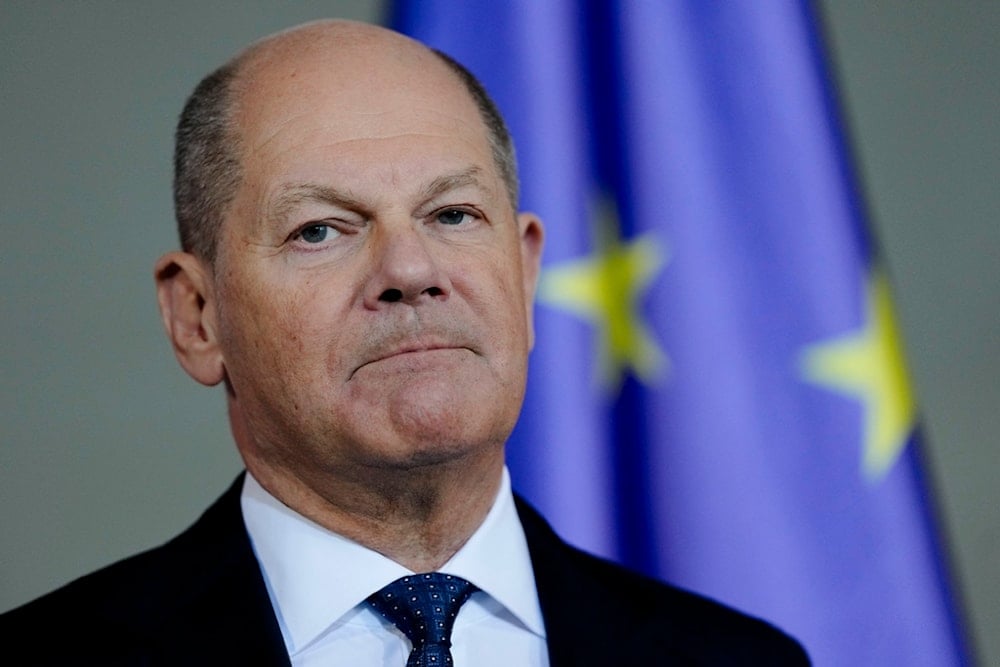Scholz rejects Trump's bid to raise NATO defense spending to 5% of GDP
German Defence Minister Boris Pistorius echoed Scholz's stance, describing the proposed 5% target as unrealistic.
-

German Chancellor Olaf Scholz gives a statement at the chancellery in Berlin, Germany, Wednesday, Jan. 8, 2025 (AP Photo/Markus Schreiber)
German Chancellor Olaf Scholz has voiced his opposition to a suggestion from US President-elect Donald Trump that NATO countries increase their defense spending to 5% of GDP. Scholz argued that such a figure is excessive and deviates from the alliance's established framework.
In an interview with Focus Online, Scholz remarked, "That's a lot of money," adding that NATO already has "a very clear procedure" regarding member contributions. He highlighted that the current target for alliance members is set at 2% of GDP.
Breaking down the numbers, Scholz explained that meeting a 5% target would require Germany to allocate approximately €200 billion annually, a figure that dwarfs the country's current federal budget of €490 billion. "And that's why I think it's better to concentrate on the path that NATO has long agreed on," Scholz concluded.
While Scholz acknowledged the need for Germany to enhance its contributions to security, he emphasized that Berlin has already made significant progress. Over recent years, Germany has nearly doubled its annual defense spending to €80 billion. Following the start of the Ukraine war in 2022, the country also committed a one-time investment of €100 billion to modernize its military.
German Defence Minister Boris Pistorius echoed Scholz's stance, describing the proposed 5% target as unrealistic. "I don't know which country will be able to afford that," Pistorius said during a meeting at the Ramstein airbase in southern Germany. He noted that what matters is not percentages but NATO's ability to achieve its capability goals, stating, "It's not a question of percentages but rather how NATO's capability goals are defined and met."
Read more: UK leading NATO's eastern flank drills with 2,600 troops, 730 vehicles
German opposition leader Friedrich Merz on Wednesday expressed similar concerns, stating that while Germany plans to increase defense spending, he would not commit to the NATO defense spending target proposed by Trump.
"We first really have to reach the 2% lower limit in Germany. We are not there yet," Merz told Bayerischer Rundfunk.
German Recession
This comes as Germany faces its most brutal recession since WWII. A report published by the Handelsblatt Research Institute (HRI) on January 4 revealed that the German economy contracted by 0.3% in 2023, 0.2% in 2024, and 0.1% in 2025, marking the longest downturn since the post-war era.
HRI chief economist Bert Rurup described the crisis as Germany’s "greatest in post-war history," citing demographic challenges and an aging population that have reduced annual growth potential to 0.5%. Rising energy costs, driven by the loss of access to Russian gas and reliance on more expensive liquefied natural gas (LNG) imports, have severely impacted manufacturers and small businesses, leading to shutdowns and bankruptcies.
The Nord Stream pipeline destruction in 2022 and Russia's suspension of gas transit to the EU in January 2025 further strained Germany's energy supply. Former Chancellor Angela Merkel criticized the shift away from Russian gas, calling it a "win-win situation" that stabilized energy prices in the past.
Economic concerns now dominate public discourse, with polls identifying it as the top voter priority. These issues contributed to the collapse of Chancellor Olaf Scholz’s coalition government in November, prompting an early general election scheduled for February 23.
Read more: German opposition's chancellor candidate backs trade talks with Trump

 4 Min Read
4 Min Read








